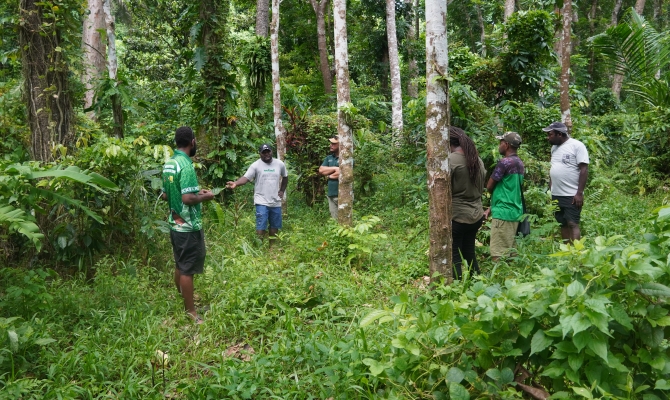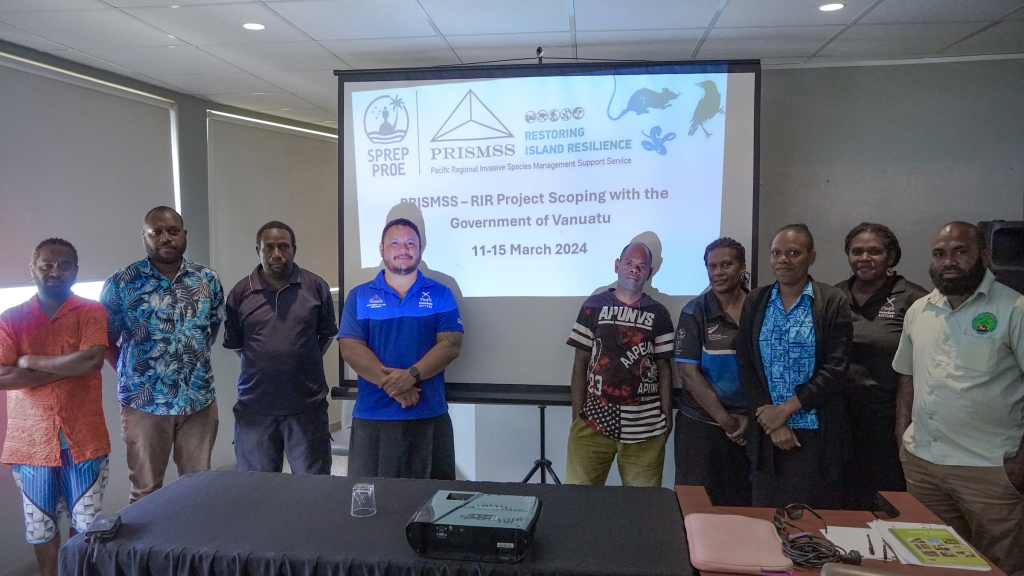
2 April 2024, Port Vila – The Nusemetu Community Conservation Area (CCA) in Vanuatu, on the Island of Tanna, has been chosen as a key site to pilot an invasive species management initiative. It has also been chosen as a site tore-introduce lost native species as key actions for climate change adaptation following the recent Resilient Ecosystems-Resilient Communities (RERC) stakeholder’s workshop in Vanuatu from 11-14 March.
The workshop was facilitated by the Secretariat of the Pacific Regional Environment Programme (SPREP) Pacific Regional Invasive Species Management Support Service (PRISMSS). Led by the PRISMSS Programme Coordinator, Mr Josef Pisi, the workshop was attended by representatives from the Department of Environment Protection and Conservation, Department of Forests, Department of Agriculture, Biosecurity Vanuatu, and community members from Tanna, Malekula, Santo, and Gau islands.

During the interactive workshop, the Mentimeter (a live polling software) was used to assess possible priority sites considered for ecological restoration with the overall outcome resulting in the decision to focus on Nusemetu CCA on the island of Tanna. This initiative aims to bolster ecosystem resilience against the impacts of climate change while honouring the rich cultural heritage of the region.
The restoration initiative set to begin in July 2024 under the New Zealand Government funded PRISMSS Restoring Island Resilience Project, has designated 21 hectares within the Nusemetu CCA to trial multi-taxa invasive species management. The area was selected due to its cultural and ecological importance to local communities.
Mr Bob Kew, a local conservation specialist and representative from Nusemetu community, was pleased with the outcomes.
"Invasive species control has been identified as one of the key management activities under the Nusemetu Community Conservation Area Management Plan, and this PRISMSS project will directly address this. I cannot wait to share this news with my community when I go back to Tanna,” he said
The Department of Environment Protection and Conservation (DEPC), which will oversee in-country coordination for the project, welcomed this development with Ms Mimosa Bethel, Vanuatu Biosafety and Invasive Species Officer, highlighting the significance of this opportunity in bridging management gaps related to biodiversity protection and conservation.
“This opportunity will certainly address the management gaps relating to biodiversity protection and conservation in Vanuatu, and hopefully we can utilise this opportunity to establish an invasive species networking group for the island,” Ms Bethel said. “Vanuatu is currently working on updating its National Invasive Species Strategy and Action Plan (NISSAP) to be completed at the end of 2024 and this work will inform some parts of the NISSAP.”
The four-day mission included a practical weed management training with Community Rangers from Gau, Tanna, Santo and Malekula. The training introduced management approaches, safe use of herbicides and their application to manage invasive weeds at a site.
The SPREP delegation met with the Department of Environment Protection and Conservation to discuss and agree on human resources, equipment, materials and other support needed to carry out the restoration project. Additionally, assessments on widespread weeds and potential priority islands for eradication were also carried out during the workshop which Mr Pisi stated will help inform further engagement from other PRISMSS programmes.
“PRISMSS is no stranger to Vanuatu,” said Mr Pisi. “The PRISMSS Natural Enemies - Natural Solutions (NENS) programme which focuses on the biological control of widespread weeds is currently active in Vanuatu, led by PRISMSS partner, Manaaki Whenua Landcare Research which has been working closely with the Vanuatu Biosecurity since 2018 to address agricultural weeds.
“While most of the weeds identified by the stakeholders already have natural enemies available already, there were other species identified that do not and which could potentially provide opportunities for further engagement from our NENS technical partner.
“There is also potential for a Predator Free Pacific (PFP) Programme to engage with islands such as Laika, Torres, Dany, and Anietym now identified through our workshop but as far as the RERC Programme is concerned, the Nusemetu CCA ticks all the boxes for an ideal restoration site in terms of enhancing the communities’ biodiversity and ecosystem services, building community resilience, improving socio-economic benefits, and preserving the cultural significance and integrity of the site.”